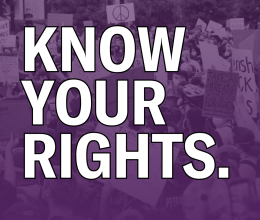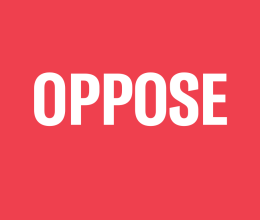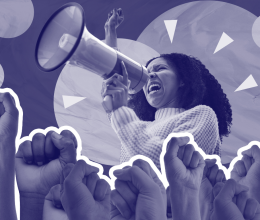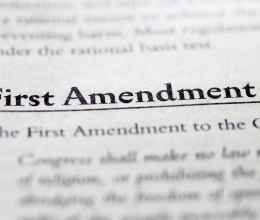In the early months of 2020, parents of DCPS students (ranging from elementary to high school grades) expressed concerns to us about how the DCPS Student Technology Responsible Use Agreement School Year 2019-20 (“Use Agreement”) might chill their children’s online speech and subject them to discipline for constitutionally protected speech. Based on our review of the Use Agreement, we identified four types of constitutional problems with the way the DCPS was regulating student speech:
A. Two provisions of the Use Agreement reached beyond the school environment to ban constitutionally-protected out-of-school speech.
B. Several provisions imposed vague or unconstitutionally broad restrictions on student communications.
C. A provision about online impersonation could prohibit some protected speech, including expression using a gender identity different from a student’s sex assigned at birth.
D. A provision required students to report to teachers certain types of online speech by others.
A few examples from the Use Agreement illustrate our concerns. For instance, one provision of the Use Agreement required each student to agree that “I will not ... make discriminatory or derogatory remarks about others online while ... out of school;” and another required each student to agree that “I will not use social media, messaging apps, group chats, and other websites outside of school in a way that negatively impacts my school community.” These are constitutionally problematic because they regulate student speech entirely outside of school without a showing of substantial disruptiveness to the school environment—which is the dividing line between what speech a school can constitutionally restrict and what it can’t. Just because a remark is “derogatory” does not make it disruptive to the school environment, especially if it occurs out of school. “Derogatory” remarks about “others” could be any negative comments about anyone in the world—a relative, a neighbor, a celebrity, or a politician. This category could easily cover core political speech. In this era of polarized politics, it would not be surprising to read a student message that was “derogatory” of national or local political figures such as President Trump or Mayor Bowser. Opining that “President Trump is a white-supremacist liar” or “Mayor Bowser’s support for Michael Bloomberg shows that she condones police racism” would be both derogatory and convey an important political message. DCPS cannot ban such pure political speech absent some reasonably foreseeable, material disruption at school.
Further, vague standards like “negatively impacts [the student’s] school community” are completely inadequate to provide students with notice of what speech is prohibited. Does criticism of a teacher’s presentation style or grading practices “negatively impact” the “school community” by diminishing her standing in the eyes of other students? Would criticism of the District’s handling of the COVID-19 crisis “negatively impact” the “school community” by lowering morale? School administrators might see these examples—and a countless more—in a variety of ways. To the extent administrators deemed the speech to be prohibited, the “negatively impact” provision would be overbroad, and once again impinge on core political speech. Even to the extent administrators would deem borderline cases not to violate the Use Agreement, the unpredictability of such judgments would lead students to self-censor. In addition to chilling student expression, discipline based on highly subjective standards might well fall most heavily on students of color and students with disabilities—a well-documented problem in school discipline generally.
An additional provision to which we objected—“I will be respectful of my peers by not writing anything or posting images that may be mean or hurtful to or about another person online or in my course work”—demonstrates how these provisions could, in addition to trenching on freedom of speech, work against the harassment-free environment they purport to foster: What if a student who has been victimized by racial harassment wishes to raise awareness and seek community support by sharing a photo of the racial slur that someone scrawled on her locker? That speech certainly could “be ... hurtful to... another person” who sees it, even if that person shares the speaker’s sense of outrage.
And DCPS does not need these provisions to address bullying, which the Use Agreement addressed by separate language requiring students not to “bully or harass other people by sending, sharing or posting hateful or harassing messages.”
In April 2020, we wrote to DCPS to share our concerns and seek reforms. Given the remote-learning mandate of DCPS in light of the COVID-19 pandemic, combined with the Mayor’s stay-at-home order, we warned that provisions governing students’ technology were likely to apply to most if not all of students’ in-school communications and (given the expansiveness of the Use Agreement) to students’ out-of-school communications as well.
In May, DCPS responded by promising substantial modifications to its policy addressing each of our areas of concern. All references to “out of school” speech will be eliminated, along with the vague phrases like “negatively impact the community” and “may be hurtful.” DCPS also stated that it would clarify the anti-impersonation provision so as not to reach the types of speech that concerned us and would make the teacher-reporting provision non-mandatory.
We informed DCPS that we were satisfied with these changes.



